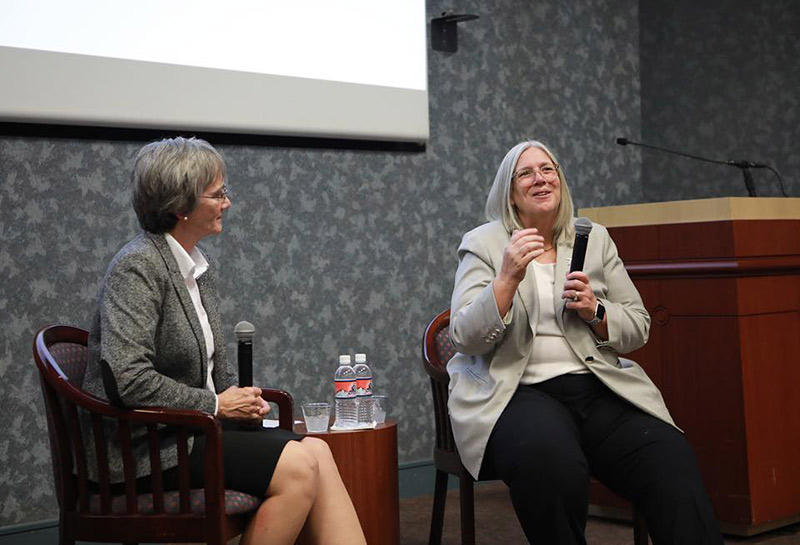Former Top Intelligence Official Delivers Centennial Lecture
Last Updated on December 11, 2019 at 12:00 AM
Originally published December 11, 2019
By Julian Herrera
UTEP Communications
Susan M. Gordon, the former Principal Deputy Director of National Intelligence chronicled the trials and successes of her extensive career in the intelligence community (IC) in her Centennial Lecture, titled "How I Joined the CIA," on Monday, Dec. 9, 2019, to a captivated crowd in the Undergraduate Learning Center.

“We are going to have to create anew,” Gordon said. “This is a world where we are not going to be able to draft off of our predecessors. It is a different enough world because it is different technology and digital connectedness and massive data, and we are going to have to be able to do the same vision differently.”
After earning her bachelor’s degree in zoology (biomechanics) from Duke University, Gordon began a career with the Central Intelligence Agency (CIA), a tenure in which she held a number of executive leadership positions throughout the course of 27 years.
“Every innovation requires giving up on one or more fixed points. You cannot change and keep everything the same,” Gordon said.
In her address, Gordon explained that she was approached with the task of configuring the cyber aspect of the agency before the concept of cyber was able to be properly defined, and she accepted without hesitation. In 1998, she conceived and developed In-Q-Tel, a private nonprofit whose primary purpose was to deliver innovative technology solutions for the agency and the IC.
She credits her success to the ability to make decisions in the face of uncertainty. She assessed that the quality that differentiates leaders and innovators is being capable of making decisions and accepting the consequences.
"My way of doing it is deciding that you can bear the consequences of being wrong,” Gordon said. “If you can, go ahead and make the decision, and if you can’t, then do more work.”
Gordon contends that the success she has experienced in her developments can be attributed to the diversity of her collaborators.
“In times of great adversity is the opportunity for great inclusion,” she said, adding that her work is a testament to the success of creating a workforce of diverse perspectives to develop insightful and comprehensive ideas.
As Gordon reflected on the various unexpected turns that her life took throughout her career, she implored the students in attendance to consider the ramifications of the work they do today on the paths they take in the future.
“You don’t always know what the path is going to look like. You can’t spend your whole life aiming at something in the future,” she said. “Be completely committed to the present, then acquire the knowledge you need to do it well.”